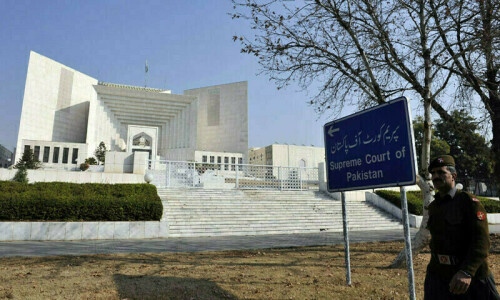KARACHI: Increasing concerns over the rights of captive animals have led to major changes at zoos around the world in the last few decades. While this process of transformation is continuing with more scientific data emerging on the complexity of animal life and the negative effects of captivity, there exists a strong opinion against the very concept of zoos.
This debate on whether to have or not to have a zoo is very much relevant to Pakistan, a country where animal abuse is rampant, laws on captive animals hardly exist, and living conditions in facilities like the Karachi Zoological Garden are extremely deplorable, to say the least.
Faiza Ilyas recently discussed this subject with Rab Nawaz, senior director programmes at the World Wide Fund for Nature-Pakistan.
Q: Is there a need for zoos in Pakistan?
A: I think zoos play an important role in raising awareness especially in a country like Pakistan where a large majority of the general public does not have access to wilderness areas. For this reason, I think it’s important to improve the conditions of existing zoos by setting up an autonomous expert committee to run [their] affairs without any political interference.
However, I will not suggest that more zoos are opened.
Q: Is there any zoo in the world that could be a model for us?
A: There are many models around the world. However, each zoo has its own particular set of issues and successes so I cannot pinpoint one that can be used as a model. One can say that the Lahore zoo is an example where things have improved.
For instance, they worked on how to reduce anger in animals especially large mammals like big cats by using simple techniques such as hiding their food so that they had to spend time and undergo a lot of physical exercise to find it. It’s a very simple thing but has had a big positive impact on the animal’s psychology.
They also engaged awareness officers to take children around the zoo in an attempt to raise awareness. This improved the public attitude towards conservation and more importantly captive animals. Lastly, the zoo management was reasonably independent so they could decide on plans, budgets and implementation.
Q: Should we have elephants in our zoos since elephant exhibits at a number of zoos in other parts of the world have closed down after research has shown that these mammals have complex psychological needs?
A: I agree that zoos should not keep large animals if they don’t have the space. Additionally, elephants are not found in Pakistan so do not play a huge role in raising awareness. Unfortunately, they have been here for a long time so I don’t have an easy answer [regarding] what to do with the existing mammals.
One major drawback of having exotic species is that these animals can never be released into the wild and, in many cases, other zoos wouldn’t want them. There is an advantage in having species from other regions but they shouldn’t be brought to zoos at the cost of their health and well being. Places like Lahore and Karachi are hot and humid so many species can’t survive such harsh weather conditions and shouldn’t be kept in their zoos.
Most large vertebrates are negatively impacted by being in captivity. Such animals include big cats, primates and polar bears.
Q: Would you give some suggestions to the Sindh government on the Karachi zoo revamp plan?
A: Give the management of the Karachi zoo to relevant experts. Having it under the Karachi Metropolitan Corporation hasn’t been successful. The Lahore zoo is under the Punjab Wildlife Department and is being run well by their experts. A zoo director should be given a free hand and resources.
As I said, simple techniques can bring about major changes in animal behaviour. Conservation or awareness officers at zoos can raise awareness [about] animals. They could even be volunteers. Good signage is also important and is often missing in zoos. Given that most urbanites now have smartphones, zoos can quite cheaply develop an app for people to use at the zoo — especially if they provide free Wi-Fi service.
There are also international guidelines on the size of zoo enclosures. This should be a minimum standard. Many zoos are not pressed for space so it would be better to invest in a couple of good quality exhibits rather than trying to maintain a long list of animals.
Published in Dawn, March 16th, 2017















































